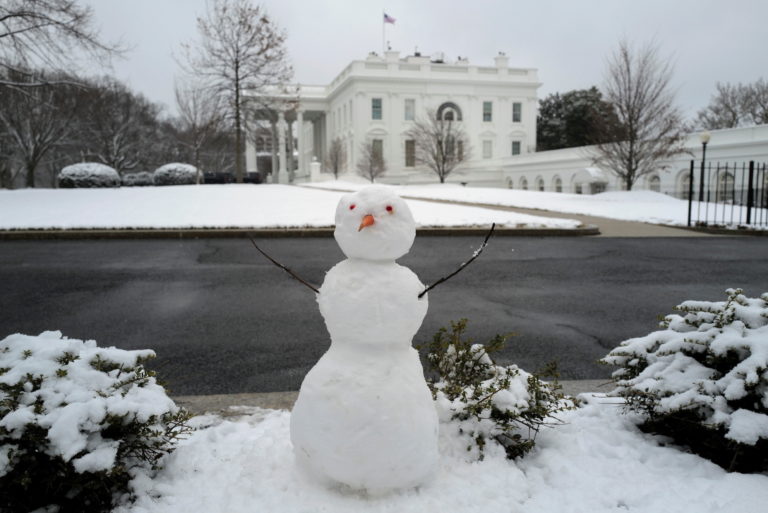President Biden is expected to sign a series of executive orders this week on immigration, including one setting up a task force to reunite families separated at the Mexican border under former President Trump’s "zero tolerance policy." Amna Nawaz reports on two mothers in Central America who have been waiting years to be reunited with their children.
Read the Full Transcript
Notice: Transcripts are machine and human generated and lightly edited for accuracy. They may contain errors.
-
Judy Woodruff:
President Biden is expected to sign a series of executive orders on immigration this week, including one setting up a task force to reunite families separated at the Mexican border under former President Trump's zero tolerance policy.
We connected with two mothers in Central America who have been waiting years to be reunited with their children. We begin with one of their daughters, who is now living in the U.S.
To protect your identity, we don't show her face.
Amna Nawaz is back with that story.
-
Amna Nawaz:
It's Saturday morning, and that means horseback riding lessons for Maria. Her life today is a world away from the life she left behind.
In August of 2017, she and her mother fled violence in El Salvador after local gangs threatened to kill Maria, a name that we're using to protect her identity.
Maria and her mother requested asylum at the U.S. border, but, like thousands of other families at the time, were separated by U.S. officials under a Trump administration policy. Maria was 12. Her mother was deported, and Maria was left behind.
-
Maria (through translator):
She was sent to El Salvador, and I stayed here. I didn't know anything about all this at the time.
-
Amna Nawaz:
More than 2,000 miles away, her mother, Yeni, remembers the last time she saw her daughter.
-
Yeni (through translator):
The idea was to protect her, not make her suffer. I cried to the officer. I cried and told her: "I don't want to be separated from my daughter. I don't want to be separated."
-
Amna Nawaz:
Yeni says U.S. officials told her, if she signed a document dropping her asylum case, she and Maria would be reunited and deported together.
-
Yeni (through translator):
And I showed the officer the paper I signed. I had it in my hand. It's all I had to show them, because they said my daughter was going to come with me.
And he said: "We don't know anything about that."
And I had to go home alone, and I left my daughter.
-
Amna Nawaz:
Back in El Salvador, Yeni reunited with Maria's father. She has her hands full with their 2-year-old twins, while he runs their small grocery store.
As much as Yeni misses her daughter, she knows Maria is safe from the gangs that threatened her. Meanwhile, after more than seven months in federal custody and two difficult temporary homes, Maria now lives with a stable family in Wisconsin, who are also hosting other migrants.
-
Danae Steele:
Honey, I think of you all the time, just so you know.
(LAUGHTER)
-
Amna Nawaz:
Danae Steele And Marijke Van Roojen are Maria's legal guardians in the U.S. In nine short months, they have tried to help her build a new life, with school, friends, and family activities.
But the separation, they say, has traumatized her.
-
Danae Steele:
I will tell you one story. We went camping one night.
So, I went to look for her. And she was in my car curled up in the backseat just sobbing. And so I just — I will cry when I say this. But so I just sat there and held her. She kept saying: "My heart is broken. My heart is broken."
We cannot replace her relationship with her family. We love her dearly, and I know she loves us. And it's still like, if you have a beloved aunt or your grandmother, they still do not replace your parents.
-
Amna Nawaz:
Maria's immigration case to decide if she can stay in the U.S. or not is pending. Phone calls and video chats like these are the only contact she has with her mother.
-
Yeni (through translator):
Sometimes, I tell her to please forgive me for taking that decision. I know, though, that I did it to protect her, not to hurt her more. But, sometimes, things don't turn out like you think they will.
-
Amna Nawaz:
Experts have been raising concerns about the harm caused to nearly 5,000 children like Maria, separated from their families by the U.S. government in 2017 and 2018 after arriving at the U.S. border.
Only under a court order did the separations end and the reunifications begin, propelled by advocates and activists fighting to reconnect families.
At the "NewsHour," we followed the story of 3-year-old Sofi, separated from her family at the border and reunited after seven weeks in custody.
But months of chaotic separations, done with no central tracking, nor plans to reunify, have left a long shadow. The parents of more than 600 children have yet to be located, and hundreds of children remain separated, even though lawyers have tracked down their parents. Even for those reunited, experts say the trauma will be lifelong.
-
Wendy Young:
In the 30-plus years that I have been doing this work, I have never seen such an inhumane policy implemented by an administration.
-
Amna Nawaz:
Wendy Young is the president of KIND, an organization that advocates for unaccompanied migrant children.
-
Wendy Young:
And what we saw with many of the kids, it was that they were angry with their parents or they were confused. They shut down. In their child's mind, the parent had abandoned them because they didn't understand that it was the government, the U.S. government, that was doing this to them, and that their parent had no choice.
-
Amna Nawaz:
Sandra, who lives by herself in Guatemala, was separated from her two children after requesting asylum at the U.S. border in May of 2018, the height of the zero tolerance policy.
They, too, had fled violence. Her kids are now 13 and 14, living with their uncle in Cincinnati. After two years apart, this is how the family spent Christmas.
-
Sandra (through translator):
When I left for the United States, I never thought that they would separate us. When I got to the border, when immigration picked me up, they told me that they had to separate mothers.
For me, it's difficult. It isn't easy for a mother or her children. It's very difficult.
-
Amna Nawaz:
After being deported, Sandra first returned to her rural village in the highlands. Six months later, she tried again to enter the U.S.
-
Sandra (through translator):
Why did I go back? Because I wanted to be with my children. I don't want to live here without my children. I went back, and I had to pay someone again to take me.
-
Amna Nawaz:
And once again, she was apprehended by U.S. immigration officials.
-
Sandra (through translator):
They told me, why did you come back, if you already had a deportation order from the last time? Because I was separated from my children. That's why. I wanted to come back to be with my children.
The judge gave me a 30-day sentence. I was in jail 30 days, and then they deported me again.
-
Amna Nawaz:
She's at a loss of what to do, and desperate to reunite with her children, who don't see any future for themselves in Guatemala.
-
Sandra (through translator):
They tell me: "Mama, come. You're alone there. We need you, mama."
-
Amna Nawaz:
Wendy Young says the Biden administration can and should act to reunite families quickly and help them to heal over time.
-
Wendy Young:
We have done these families incredible harm, and we really owe it to them to do the best we can to provide them with that protection, with that status, bring them back together, and then also provide them with support services to recover from this trauma that they have experienced.
-
Amna Nawaz:
Back in Wisconsin, Maria is focused on her studies, and says she now wants to become a doctor.
-
Maria (through translator):
God willing, if I can stay here and finish my studies, I want to have a profession where I can help people.
-
Amna Nawaz:
Her mother, Yeni, has her own dream.
-
Yeni (through translator):
Every parent dreams of always being by their child's side, never being separated, watching them grow up, seeing every stage they go through.
-
Amna Nawaz:
Do you and your mother talk about when you will be able to see each other again?
-
Maria (through translator):
Sometimes, we talk about how we might see each other. We talk about how we aren't going to see each other, perhaps for many years.
Sometimes, it's very difficult to answer that question, because it's out of my hands. There's no way to know when I will see her again.
-
Amna Nawaz:
And no way to know yet where that will be.
For the "PBS NewsHour," I'm Amna Nawaz.









What do you think? Leave a respectful comment.